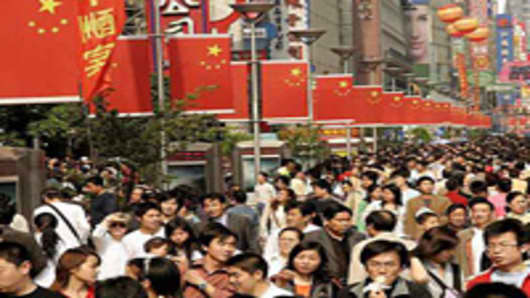China is grinding towards its slowest growth in a decade, corporate profits are in free fall and the stock market is in the dumps. But take a random sample of its people, from white-collar workers to migrant laborers, and a large number will express satisfaction with the current state of the economy.
One reason for this sanguine attitude is that average incomes have more than tripled over the past decade, putting a far better quality of life within the grasp of most Chinese. The job market also remains tight, reducing unemployment to a distant concern.
But there is also another possibility – that China’s stunning growth of the past 30 years may have led to a false sense of confidence and a failure to appreciate how much tougher the future might be.
Sluggish manufacturing data on Monday all but guaranteed that growth ebbed towards 7 percent in the third quarter, a seventh successive quarterly slowdown, and down from double-digit growth just two years ago, with few signs of a strong recovery in the offing.
For now, though, many ordinary Chinese think the economy is doing just fine.
“Maybe the economy is slowing, but I certainly don’t feel it. I just think that you westerners don’t work hard enough,” said Sun Kaijun, 40, an auto mechanic in Beijing.
Mr. Sun bought a car last year – something that he says would have been unthinkable a decade earlier – and doubles his monthly income to about Rmb8000 ($1270) by running a private taxi service in his spare time.
It is not just about toiling for long hours. Chinese people are also enjoying more leisure time. Hotels at the base of Yellow Mountain, a jagged range in central China that has been depicted for centuries in traditional paintings, were filling up with tourists before a week-long public holiday, which started on Sunday.
“I love travelling and I’m going to travel all over China when I retire. I think you can really start having fun when you turn 60 (retirement age),” said Zheng Minsheng, 58, a convenience store clerk. He said his pension would be Rmb2000 a month, about the same as he currently earns and much more handsome than the meager payouts for retirees that were the norm just a few years ago.
Generalizing about public opinion is a difficult task in China because of vast regional differences and tight government restrictions on polling. Nevertheless, even assuming that their results are somewhat distorted, poll after poll points to remarkably broad contentment with the direction of the Chinese economy.
The Pew Research Center’s Global Attitudes Survey, published in July, showed that 83 per cent of respondents in China thought the country’s economic situation was good, far more than in any other country. Looking to the future, the Boston Consulting Group found that the vast majority of Chinese – 83 percent again – believed the next generation would have a better life, whereas only about 20 percent of Europeans and Americans held a similar belief.
Such high levels of satisfaction are a strong endorsement of the ten-year rule of the leadership duo of Hu Jintao and Wen Jiabao who will soon be stepping down.
But it might also prove a major challenge for the incoming pair, Xi Jinping and Li Keqiang, who are expected to start taking formal control in November and, if all goes according to plan, will govern for the next decade.
China’s rapid growth of the past three decades has fuelled expectations of a steadily improving future that they may struggle to fulfil. A popular expression in recent years gets to the nub of how prosperity can breed discontent: “When you pick the bowl up, you eat meat. When you put it down, you start cursing.”
Ordinary citizens do indeed have a litany of complaints about the economy. To name a few, only the richest can afford homes in China’s biggest cities; the wealth gap has widened dramatically since market reforms began in 1978; and official corruption is pervasive.
However, as long as growth has been strong, these complaints have been tempered by the sense that life is on the whole getting better. Tens of thousands of protests break out every year, but most are local in nature – anger at a polluting plant or illegal land transfers – and do not reflect concerns about the overall economy.
It helps, of course that China is coming from such a low base. More than 430 million Chinese are covered by basic health insurance, up from just 40 million a decade ago. Material wealth has also boomed – for example, there is now an average of 1.1 air conditioning units per household, up from 0.3 in 2000.
“Although growth is slowing down, income growth is still there. With that, you are going to see optimism,” said Dong Tao, an economist with Credit Suisse.
“But the current slowdownis going to persist much more than people believe. Many are not prepared to see a slowdown for three years,” he said. “The risks have not been properly reflected in their thinking.”
Zhang Ya, 24, opened a small store selling Apple products two years ago in the tourist mecca at the base of Yellow Mountain. Few customers have been coming in recently but he said online sales were doing very well.
“I’m not worried. There must be things to sell. Cars, mobile phones and so on,” he said. “If things turn really bad, I’ll just move to a bigger city for work.”
Additional reporting by Emma Dong


